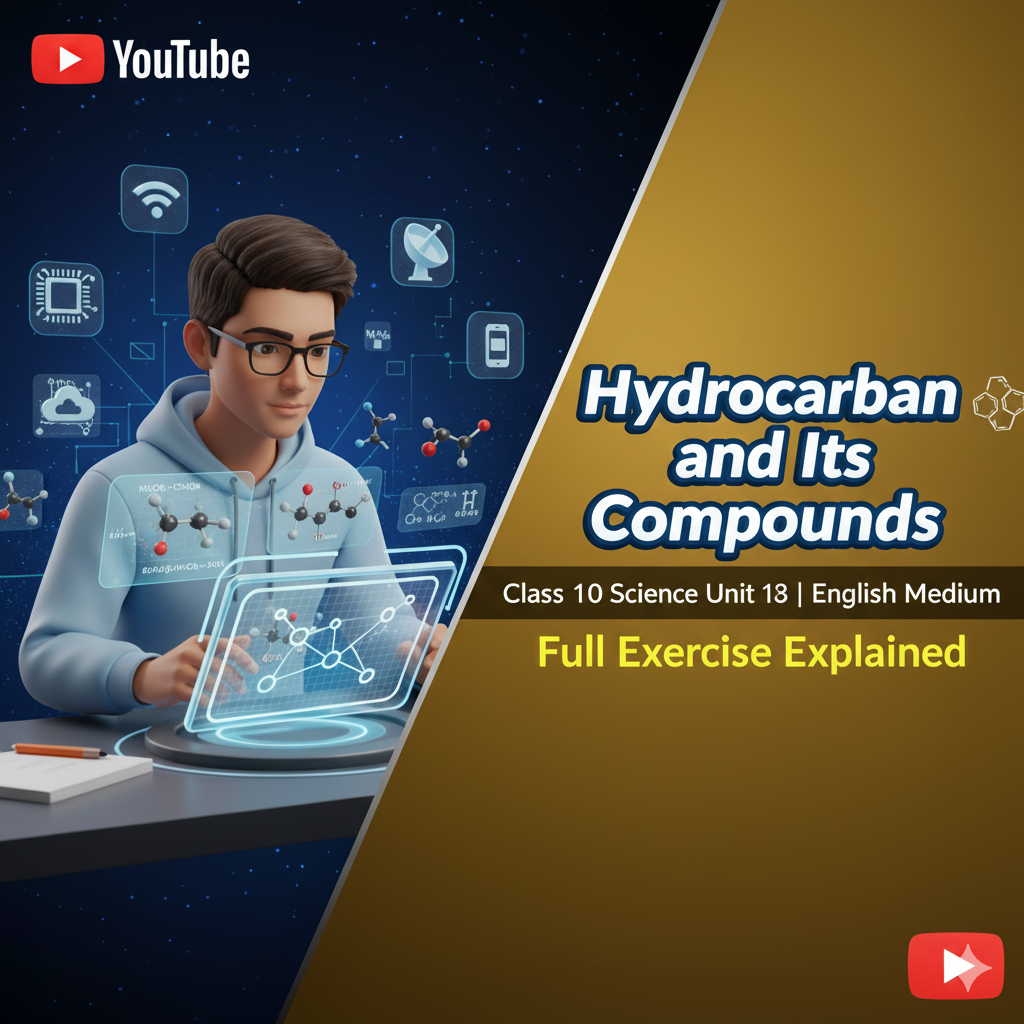Master Class 10 Science Unit 18: Hydrocarbon and Its Compounds – Essential Exercise Guide
Welcome to our comprehensive guide for Class 10 Science Unit 18 focusing on Hydrocarbon and Its Compounds. This crucial chapter explores the fascinating world of organic chemistry, carbon compounds, and their real-world applications. In this detailed post, we provide complete exercise solutions, essential insights, and proven strategies to help you master this important topic for your final examinations.
Understanding Class 10 Science Unit 18: Hydrocarbon and Its Compounds
In Class 10 Science Unit 18, students dive into the fascinating realm of hydrocarbons and their compounds, exploring carbon’s unique bonding properties, classification of organic compounds, and practical applications in daily life. This unit establishes a critical foundation for understanding organic chemistry concepts that you’ll encounter in advanced studies.
Essential Concepts in Class 10 Science Unit 18
The Class 10 Science Unit 18 curriculum covers several fundamental topics that every student must master for examination success:
- Unique properties of carbon and catenation
- Classification of hydrocarbons – Alkanes, Alkenes, Alkynes
- Functional groups and homologous series
- Nomenclature of carbon compounds (IUPAC system)
- Chemical properties and important reactions
Carbon’s Unique Properties in Class 10 Science Unit 18
When studying Class 10 Science Unit 18, you’ll discover carbon’s exceptional ability to form four covalent bonds, leading to the formation of millions of organic compounds. This tetravalency, combined with catenation (self-linking property), makes carbon chemistry incredibly diverse and forms the basis of all life on Earth.
Hydrocarbon Classification in Class 10 Science Unit 18
A significant portion of Class 10 Science Unit 18 focuses on classifying hydrocarbons based on their bonding patterns. You’ll study saturated hydrocarbons (alkanes with single bonds), unsaturated hydrocarbons (alkenes with double bonds and alkynes with triple bonds), and learn to distinguish between them based on their chemical behavior and molecular structure.
Important Note for Class 10 Science Unit 18
Mastering the IUPAC nomenclature system is absolutely essential for success in Class 10 Science Unit 18. This systematic approach to naming organic compounds ensures clarity and consistency. Practice naming various hydrocarbons until you can confidently apply the rules to any compound you encounter.
Functional Groups in Class 10 Science Unit 18
The concept of functional groups forms a critical component of Class 10 Science Unit 18. You’ll learn how specific atoms or groups of atoms (like -OH, -CHO, -COOH) attached to carbon chains determine the chemical properties and reactivity of organic compounds, allowing chemists to predict how different substances will behave in reactions.
Homologous Series in Class 10 Science Unit 18
Understanding homologous series is vital in Class 10 Science Unit 18. This concept explains how organic compounds with the same functional group but differing by a -CH2- unit show gradual changes in physical properties while maintaining similar chemical behavior, creating predictable patterns that simplify the study of organic chemistry.
Chemical Reactions in Class 10 Science Unit 18
The exercise section of Class 10 Science Unit 18 extensively covers important chemical reactions including combustion, oxidation, addition, and substitution reactions. Understanding the conditions and mechanisms of these reactions is crucial for solving problems and answering examination questions effectively.
Additional Resources for Class 10 Science Unit 18
To further enhance your understanding of Class 10 Science Unit 18, we recommend exploring these valuable external resources:
- Official CDC Nepal Website – Access the official curriculum and syllabus details
- CDC Digital Library – Explore additional reference materials and textbooks
- Social Guide – Find alternative explanations and practice questions
- YouTube Video Tutorial – Watch visual explanations of complex concepts
Exam Preparation Strategies for Class 10 Science Unit 18
When preparing for examinations, focus particularly on nomenclature, hydrocarbon classification, and chemical reactions from Class 10 Science Unit 18. These topics consistently appear in board examinations and typically carry significant marks. Create summary charts of different hydrocarbon types and their properties for quick revision.
Pro Tip for Class 10 Science Unit 18
Create flashcards for the different functional groups and homologous series covered in Class 10 Science Unit 18. This active recall technique significantly improves memory retention and will help you quickly identify compounds during examinations. Practice drawing structural formulas until you can visualize them effortlessly.
Common Challenges in Class 10 Science Unit 18
Students often struggle with IUPAC nomenclature and distinguishing between different types of isomers when studying Class 10 Science Unit 18. Remember that systematic practice with naming compounds and understanding structural differences is key to overcoming these challenges. Work through numerous examples to build confidence.
Connecting Class 10 Science Unit 18 to Real-World Applications
The concepts in Class 10 Science Unit 18 connect directly to numerous real-world applications including petroleum refining, pharmaceutical development, plastics manufacturing, and environmental science. Understanding these connections makes the subject more engaging and demonstrates the practical importance of organic chemistry in daily life.
Conclusion: Mastering Class 10 Science Unit 18
Class 10 Science Unit 18 on Hydrocarbon and Its Compounds represents a fundamental chapter that establishes essential organic chemistry knowledge. By thoroughly understanding carbon’s unique properties, hydrocarbon classification, nomenclature systems, and chemical reactions covered in this unit, you’ll build a strong foundation for your final examinations and future science studies.
Use the exercise solutions provided above to test your understanding, identify areas needing improvement, and reinforce your learning. Remember to practice regularly, approach each concept systematically, and don’t hesitate to revisit challenging topics until you feel completely confident. For more educational resources and study materials, explore our other posts on Class 10 Science topics to maximize your academic success.

